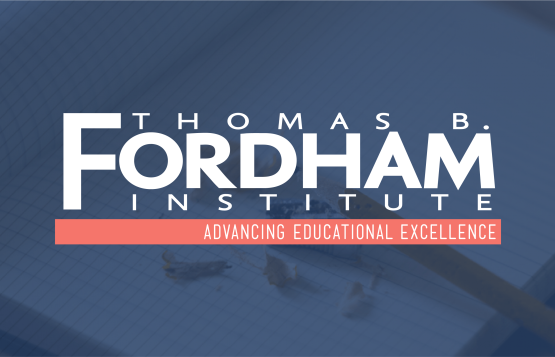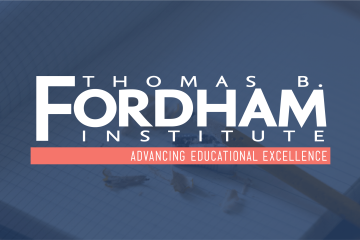No, this is not about Iraq but about four raging education battles, three in Washington and one in academe, all with mega policy implications. On the surface, each looks like a conflict between "keep it the way it is even though it isn't working" and "change it even though that'll be disruptive." Not far below is a tussle over - what else? - jobs, power, money, influence, and legitimacy.
1. Teaching Pre-schoolers
Head Start has become the subject of intense controversy on Capitol Hill as the Bush administration and some Congressmen move to reform this iconic four-decade old pre-school program in two ways. One is to focus it more explicitly on school-readiness, i.e. make it more academic and cognitive. The other is to give states greater say over it while also holding them more accountable for its results.
The rationale for greater academic oomph is clear: many poor kids are behind the academic eight ball before they reach kindergarten and Head Start is the main federal program aimed at that urgent problem. Those who resist this change prefer the program's traditional focus on "child development." Just under the surface, however, is the fact that thousands of Head Start staffers aren't qualified to teach a more substantive curriculum and would either have to get themselves retrained and qualified (the House bill would eventually require at least a college degree) or risk losing their jobs.
The administration's rationale for greater state control is murkier, and the states haven't been much help in advancing it since (as is now their pattern in education bills) the governors are sitting on their hands, apparently not keen for greater flexibility or control. (Or maybe it's the added accountability they don't want.) So the bill's latest iteration puts severe limits on the state-control piece. [See "Head Start imbroglio a struggle for hearts, minds, votes," by Linda Jacobson, Education Week, June 18, 2003.]
This battle has also grown partisan. The bill now moving through the House is a Republican creation [See http://www.edexcellence.net/gadfly/issue.cfm?issue=2#58 and http://www.edexcellence.net/gadfly/issue.cfm?issue=23#91 for more information.]. One might have expected the Democrats to mistrust the states, as is their pattern. It's less clear why they oppose the academic focus.
2. Funding NCLB
States ARE being heard from when it comes to paying for No Child Left Behind. They're bleating that the Administration and Congress haven't budgeted enough money to cover the added costs of complying with NCLB's various mandates for testing, accountability, qualified teachers, etc. Rival studies are cited as to what those costs will be - and whether they're matched by federal appropriations. Earlier this week, the dispute even made it onto NPR's "Morning Edition!"
Among the rival studies, I'll defer to the GAO, which says, in essence, that the dollars are sufficient so long as states stick to multiple-choice tests of reading and math. [For more information on the GAO study, go to http://www.edexcellence.net/gadfly/issue.cfm?issue=22#115.] But only at the surface is this really an argument about funding. Any number of federal laws create costs that exceed their accompanying appropriations because, in any number of areas, Washington has decided that some specific change is good for the country and the heck with its cost. Environmental examples are numerous. Education examples abound in the civil rights field (the Brown decision was not accompanied by an appropriation!) and for disabled youngsters (IDEA).
NCLB, too, is not really about dollars. It's about reshaping fundamental practices of schools, districts, and states so that kids learn more. As the 2004 election nears, however, this, too, is becoming a dandy partisan issue as Democrats jockey to retrieve the "friend of education" medal from George W. Bush. One must ask, though, whether their friendship is to be tallied in dollars rather than evidence of children learning and schools becoming more effective.
3. Testing Teachers
If NCLB made anything clear, it's that U.S. public-school teachers are henceforth going to be tested for academic prowess as part of determining whether they're "highly qualified" for classroom posts. The questions now become which tests will be used, what their passing scores will be and whether a test will be tied to ed school attendance or used for competency based licensure that does not presuppose time spent in an "approved" preparation program.
Today's major teacher exams are the ETS-sponsored Praxis tests and various state-specific assessments, many of them crafted by National Evaluation Systems. The new kid on the block (with its first tests to debut in August) is the American Board for Certification of Teacher Excellence (ABCTE). (I'm involved with the latter.)
Praxis and many state-specific tests are heavy on pedagogy, thin on content, and generally hostile to the view that teachers possess knowledge and skills that children need to learn. In other words, they embrace the usual "progressive" assumptions about children as wild flowers (who bloom when and where they're ready, so one mustn't expect to cultivate them) and teachers as "guides on the side." ABCTE starts from the radically different premise that the teacher is the source of skills and knowledge that it is his/her job to impart to children--and that the teacher's subject-matter content knowledge trumps pedagogy every time.
The "progressive" establishment is naturally doing its best to strangle ABCTE in its crib. Last week, a ruckus arose as several newspapers disclosed that the head of the national ed-school association had somehow obtained a copy of ABCTE field-test questions and circulated them, thus compromising the questions and field-test results and causing delays and new test-development costs for ABCTE. House Education Committee chairman John Boehner demanded an investigation by the Education Department. [see House Education Committee press release, http://edworkforce.house.gov/press/press108/06jun/teachsabotage061203.htm, and also "Congress to probe teacher ed group and its president," by Julie Blair, Education Week, June 18, 2003.
Meanwhile, ETS announced several changes in Praxis (including setting a recommended passing-score for the first time) and forged a new alliance with the main ed-school accreditation group (NCATE).
In other words, the teacher preparation and testing powers that be are adapting to changed circumstances and responding to competition - while also trying to throttle their new rival. Their market share and monopoly position are at stake.
4. Evaluating Vouchers
Do vouchers work? In particular, do they enable needy children to move to schools where they learn more than similar children who don't move? We'll never know for sure until we try a proper large-scale, long-lasting voucher experiment, which has not yet occurred anywhere in America. But illuminating data have emerged from several smaller voucher experiments, paid for with private dollars, in New York, Washington, and Dayton. What lessons to draw from those data, however, is the subject of a big dispute.
Harvard's Paul Peterson and his colleagues concluded that moving to private schools with vouchers' help significantly boosted the test scores of black youngsters while having no significant effect on the academic performance of equally poor Hispanic and white kids. (Nobody has been able to explain that difference, though many conjectures have been offered.)
Princeton economist Paul Krueger and a colleague reanalyzed the same data, using different assumptions and analytic methods, and concluded that the vouchers had no significant effect on black students. [For the Gadfly's review of the Krueger report, go to http://www.edexcellence.net/gadfly/issue.cfm?issue=18#215.]
Last week, Peterson & Co. responded, explaining why their original findings were correct and questioning some of Krueger's assumptions and methods. [For the study, go to http://www.ksg.harvard.edu/pepg/.]
On its face, this is an obscure academic squabble about statistical procedures and social science methods, the stuff of seminars and scholarly journals. Why, then, has it (twice) turned up at the National Press Club? Because its political and policy implications are immense. If vouchers are good for black kids and can help close America's most vexing achievement gap, there should be more of them. If they make no discernible difference, what's the point?
Where does this stand today? To repeat, far more comprehensive experimentation is needed before we'll know as much as (almost) everybody would like to know about the efficacy of vouchers as an education enhancer for poor children. As regards the New York (and Washington and Dayton) data, however, the Peterson team is ahead by a nose. Their critics (including Krueger) are now disputing the "robustness" of their findings rather than the existence of evidence that low-income black children benefit from attending private schools. [see "Report defends vouchers, but fails to quell debate," by Sam Dillon, New York Times, June 13, 2003.
The significance of these four struggles? Education change is at war with inertia. New ideas seek to displace old. Many interests hang in the balance. It's good, once in a while, to remind ourselves that these ought to include the interests of children, not just grownups.

